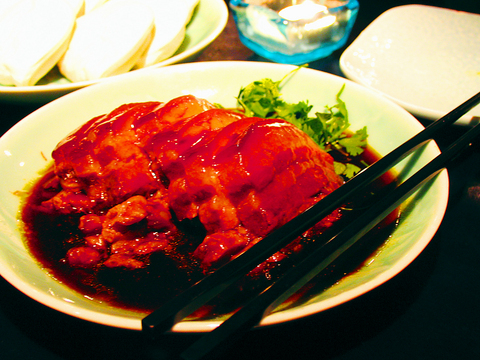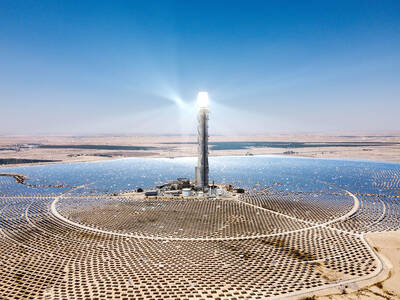If it's any testament to how well Isabelle Wen's fashionable new eatery above Renai Road is doing since its opening a few months ago, there wasn't a seat available at 8pm on Monday. Taipei's own design diva seems to have had no problem making the leap from haute couture to haute cuisine.
But haute cuisine doesn't exactly describe what comes from the kitchen into the chic dining room at Fifi. It's Shanghai and Szechuan cuisine, to be sure, but not like what you've come to expect at similar restaurants around the capital city.
You'll notice the difference from the appetizer page of the menu (NT$180 to NT$280), where stuffed green peppers, green beans with mustard, and bean curd stripped salad vie for your attention, on to Fifi's choices of "vegetables and eggs" (NT$220 to NT$280), as the menu lists them: Hunan double-cooked eggs, "mapao dofu" and other very interesting-sounding items.

PHOTO: DAVID MOMPHARD, TAIPEI TIMES
I chose the pumpkin with salty egg, having decided the "hairy gourd with silver fish" sounded too much like a still life painting. And I was glad that I did; the spice from the pumpkin and saltiness of the egg were nicely equalized by the dofu that found its way into each bite. I'd also ordered the stuffed green pepper, having heard from a source that it was one of the two best appetizers on the menu -- the other being the bean curd stripped salad with garlic, peanut sesame oil, cilantro and white-leaf lettuce. Alas, the stuffed peppers were sold out for the night and the bean curd salad was far more than a single person could put away.
Fifi's, it must be said, is best enjoyed with friends or family. Like so many other local restaurants, portions laid on the table are meant to be divvied up between eight to 10 people, making the ordering of as many items sumptuous but not sinful.
Not sinful until the meat comes to the table, at least. The source who told me about the bean curd salad also turned me onto Fifi's "don po pork" -- the one pictured above -- easily one of the better pork dishes I've had in a city stuffed with delicious pork dishes.
Finally, one of the better reasons to check out Fifi is the third-floor lounge that goes late on weeknights and even later on the weekends. DJ Edmund has just been confirmed as DJ for Wednesday nights.

Google unveiled an artificial intelligence tool Wednesday that its scientists said would help unravel the mysteries of the human genome — and could one day lead to new treatments for diseases. The deep learning model AlphaGenome was hailed by outside researchers as a “breakthrough” that would let scientists study and even simulate the roots of difficult-to-treat genetic diseases. While the first complete map of the human genome in 2003 “gave us the book of life, reading it remained a challenge,” Pushmeet Kohli, vice president of research at Google DeepMind, told journalists. “We have the text,” he said, which is a sequence of

On a harsh winter afternoon last month, 2,000 protesters marched and chanted slogans such as “CCP out” and “Korea for Koreans” in Seoul’s popular Gangnam District. Participants — mostly students — wore caps printed with the Chinese characters for “exterminate communism” (滅共) and held banners reading “Heaven will destroy the Chinese Communist Party” (天滅中共). During the march, Park Jun-young, the leader of the protest organizer “Free University,” a conservative youth movement, who was on a hunger strike, collapsed after delivering a speech in sub-zero temperatures and was later hospitalized. Several protesters shaved their heads at the end of the demonstration. A

In August of 1949 American journalist Darrell Berrigan toured occupied Formosa and on Aug. 13 published “Should We Grab Formosa?” in the Saturday Evening Post. Berrigan, cataloguing the numerous horrors of corruption and looting the occupying Republic of China (ROC) was inflicting on the locals, advocated outright annexation of Taiwan by the US. He contended the islanders would welcome that. Berrigan also observed that the islanders were planning another revolt, and wrote of their “island nationalism.” The US position on Taiwan was well known there, and islanders, he said, had told him of US official statements that Taiwan had not

We have reached the point where, on any given day, it has become shocking if nothing shocking is happening in the news. This is especially true of Taiwan, which is in the crosshairs of the Chinese Communist Party (CCP), uniquely vulnerable to events happening in the US and Japan and where domestic politics has turned toxic and self-destructive. There are big forces at play far beyond our ability to control them. Feelings of helplessness are no joke and can lead to serious health issues. It should come as no surprise that a Strategic Market Research report is predicting a Compound